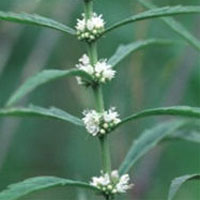
A-Z Indexes Food Health Guides
Health News |
BugleweedFind ProductsAlso indexed as:Lycopus virginicus  © Steven Foster © Steven FosterBotanical names: Lycopus virginicusHow It WorksLithospermic acid and other organic acids are believed to be responsible for bugleweed’s activity. These acids decrease levels of several hormones in the body, particularly thyroid-stimulating hormones2 and the thyroid hormone thyroxine (T4).3 Bugleweed inhibits the binding of antibodies to the thyroid gland.4 These antibodies can cause the most common form of hyperthyroidism, Graves’ disease. All these actions may help explain bugleweed’s benefit in people with mildly overactive thyroids. How to Use ItThe German Commission E monograph recommends 1–2 grams of the whole herb per day.5 Intake of tincture should be limited to 1–2 ml three times a day. Bugleweed is often combined with other herbs used to treat mildly overactive thyroid function, including lemon balm (Melissa officinalis) and gromwell (Lithospermum ruderale). Copyright © 2026 TraceGains, Inc. All rights reserved. Learn more about TraceGains, the company. The information presented by TraceGains is for informational purposes only. It is based on scientific studies (human, animal, or in vitro), clinical experience, or traditional usage as cited in each article. The results reported may not necessarily occur in all individuals. Self-treatment is not recommended for life-threatening conditions that require medical treatment under a doctor's care. For many of the conditions discussed, treatment with prescription or over the counter medication is also available. Consult your doctor, practitioner, and/or pharmacist for any health problem and before using any supplements or before making any changes in prescribed medications. Information expires December 2026. |
